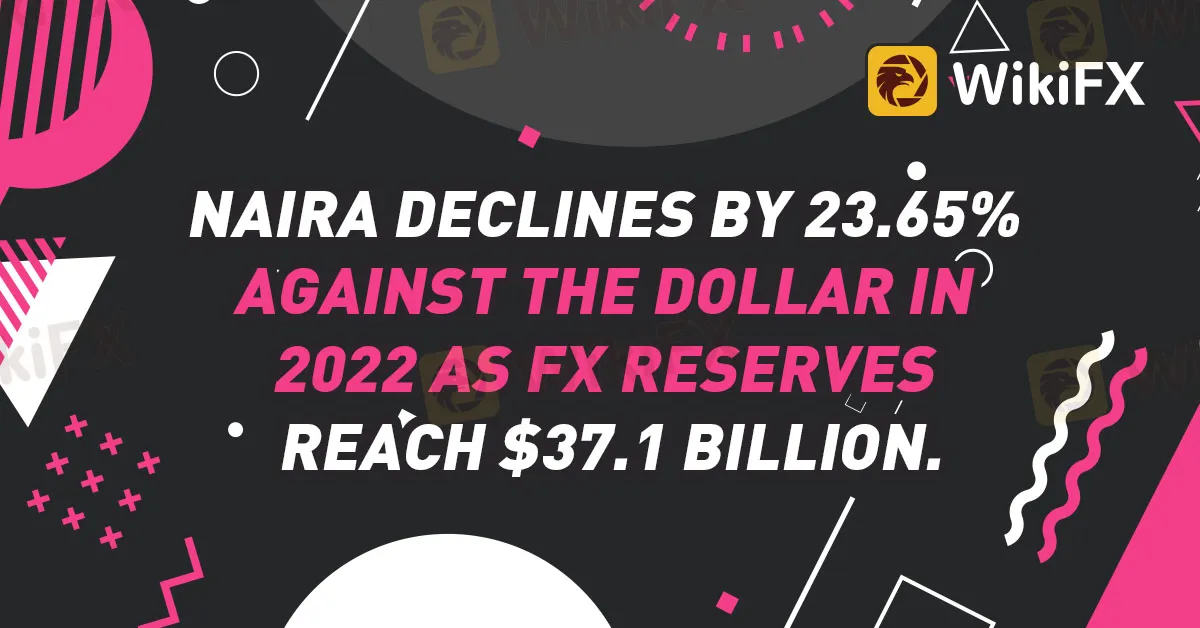简体中文
繁體中文
English
Pусский
日本語
ภาษาไทย
Tiếng Việt
Bahasa Indonesia
Español
हिन्दी
Filippiiniläinen
Français
Deutsch
Português
Türkçe
한국어
العربية
NAIRA DECLINES BY 23.65% AGAINST THE DOLLAR IN 2022 AS FX RESERVES REACH $37.1 BILLION.
Abstract:The Naira lost 23.65% (year over year) against the US dollar at the parallel market, often known as the black market when Nigeria's foreign exchange market closed out the year 2022 on Friday.

The past year has proven to be havoc for economies all around the world. The consequences of COVID-19 fiscal policies, the war in Ukraine, and the rising cost of living caused by the supply shock caused by Sanctions against Russia due to its invasion of Ukraine. It turns out we are not out of the woods yet as IMF leader Kristalina Georgieva states that a third of the world may be subject too a recession. What does this mean for us traders and how should we adjust our expectations for the trading year 2023.
Why are in at threat of a recession
The consequences of COVID-19 fiscal policies caught up to us last year and will continue to cause havoc within economies. Many governments were forced to hand out financial aid to its citizens when they could not work during the pandemic. The issue here is that there was money supply injected in the economy without any growth in business or economic growth realized hence we now had more money within economies but we also still had limited services. With an over supply of money and limited services, people tend to change to higher prices as people will bid up prices to receive the limited serves. This is bound to cause inflation (as we saw in 2022).
The supply shocks of necessary items such as oil and grains due to the Russia- Ukraine war also threw a spanner into the works. As there was already additional money injected in economies, the supply shock of essential services also contributed to advancing inflation. The price of oil was hiked extensively as there was limited supply of it as Russia's oil clients stopped purchasing oil from Russia in reaction to the war. There are a number of countries scrambling to fix this supply issue however there were a number of countries that were dependent on Russian oil supply for years on end. Finding a replacement for that supply will prove difficult and hence why the world is predicted to head towards a recession.
Another issue is the current state of affairs in China as it's economic progress has been slowed by COVID 19 social distancing policies. The Chinese government had taken a strong stance against COVID-19 within its borders as they have been subjecting its massive cities to social distancing procedures. Some of these areas support international businesses and trade, hence the shut down of these areas has caused a slow in economic growth for China. Much of these restrictions were taken down after massive protests by citizens, however there has been a resurgence in the number of COVID-19 infections and death in the country and so it is uncertain how the government is yet to act to this occurence.
How to prepare as traders
We should be on the look at two important aspects this year 1) the Russia- Ukraine war, and 2) China's response to COVID-19. If these two events continue on the trajectory that they are on at the moment we can expect the recession prediction to prove true. We should be on the watch for the USD, the EURO and the YEN as these currencies are part of the biggest economies which are certainly going to be impacted by these economic events. The value of these currencies may drop throughout the year so be ready to short them.

Disclaimer:
The views in this article only represent the author's personal views, and do not constitute investment advice on this platform. This platform does not guarantee the accuracy, completeness and timeliness of the information in the article, and will not be liable for any loss caused by the use of or reliance on the information in the article.
Read more

Has the Yen Lost Its Safe-Haven Status?
The Japanese yen failed to create a miracle in 2024, continuing its four-year decline against the US dollar. Does the yen still retain its safe-haven properties? Will the interest rate differential between the US and Japan narrow?

FINRA Orders Firms to Pay Over $8.2 Million in Restitution to Customers
FINRA orders $8.2M in restitution to customers for mutual fund sales charge waivers and fee rebate violations by Edward Jones, Osaic Wealth, and Cambridge.

China's New Forex Rules Target Cross-Border Crypto Trading
China's new forex rules tighten monitoring of cross-border crypto trades, requiring banks to track identities, fund sources, and trading frequencies.

Will Gold Break $2,625 Amid Fed Caution and Geopolitical Risks?
Gold price (XAU/USD) hovers near $2,625, supported by central bank demand, geopolitical tensions, and uncertainty over Trump's policies, but Fed caution limits the upside.
WikiFX Broker
Latest News
WikiEXPO Global Expert Interview: Loretta Joseph——Unlock the forefront of digital finance
Vietnamese Police Bust $1.2 Million Crypto Fraud Case
XTB Receives Licenses to Operate in Indonesia & UAE
SEBI Bans Big "Finfluencers for Misleading Investors"
WikiFX New Year Bash: Chance to Win 70 USDT
Will Gold Break $2,625 Amid Fed Caution and Geopolitical Risks?
ECB Targets 2% Inflation as Medium-Term Goal
New Year, New Surge: Will Oil Prices Keep Rising?
Will Gold Shine Brighter in 2025?
WikiFX Review: Is HYCM still reliable in 2024?
Currency Calculator






